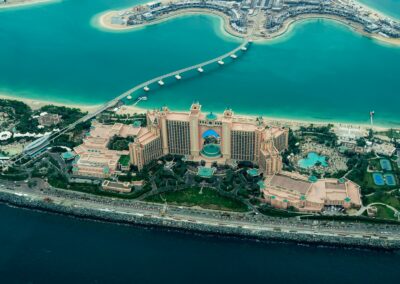The Evolution of Augmented Reality in the Travel Industry
Revolutionizing Tourism with AR Technology
One of the most promising trends in AR for tourism is the development of personalized and context-aware experiences. By leveraging data analytics and AI, AR applications can offer tailored recommendations and information based on a traveler’s preferences and real-time location. For instance, in Dubai, AR-guided tours can provide historical context, cultural anecdotes, and real-time updates about nearby attractions, making the exploration of the city more engaging and informative.
Additionally, AR can significantly enhance the way historical and cultural sites are presented to tourists. In Riyadh, for example, AR can bring ancient ruins and historical landmarks to life by overlaying 3D reconstructions, historical narratives, and interactive elements. This immersive approach allows visitors to gain a deeper understanding of the site’s significance and history, creating a more enriching and memorable experience.
Enhancing Visitor Engagement through Interactive AR Applications
The use of AR in tourism extends beyond providing information; it also plays a crucial role in enhancing visitor engagement. Interactive AR applications can turn a regular sightseeing tour into an exciting and participatory adventure. By integrating gamification elements, AR can encourage visitors to explore destinations in a more active and enjoyable manner.
Incorporating AR scavenger hunts or treasure hunts within popular tourist spots can make the exploration process more dynamic. For example, visitors to a museum in Saudi Arabia could use an AR app to find and interact with hidden artifacts, unlocking stories and information as they progress. This interactive approach not only educates visitors but also keeps them engaged and entertained throughout their visit.
Furthermore, AR can enhance accessibility in tourism by providing multi-language support and visual aids for those with disabilities. Tourists in the UAE, for instance, can use AR applications that offer real-time translation and audio descriptions, making attractions more accessible to international visitors and individuals with visual impairments. This inclusivity ensures that everyone can fully enjoy and benefit from their travel experiences.
The Role of AR in Promoting Sustainable Tourism
As the tourism industry faces increasing pressure to adopt sustainable practices, AR technology offers innovative solutions to promote eco-friendly travel. By providing virtual tours and interactive simulations, AR can reduce the need for physical travel to certain locations, thereby minimizing environmental impact. This approach is particularly valuable for preserving delicate ecosystems and heritage sites that are vulnerable to over-tourism.
For example, AR can offer virtual experiences of Saudi Arabia’s natural wonders, allowing tourists to explore these sites without causing physical harm. Virtual tours of coral reefs, desert landscapes, and protected wildlife areas can provide immersive experiences while promoting environmental conservation. Additionally, AR applications can educate tourists about sustainable practices, such as waste reduction and responsible behavior, encouraging more eco-conscious travel habits.
Moreover, AR can support local businesses and communities by highlighting lesser-known attractions and promoting off-the-beaten-path experiences. In Dubai, AR guides can direct tourists to local markets, traditional crafts, and cultural festivals, distributing the economic benefits of tourism more evenly and reducing congestion at major tourist hotspots. This not only supports local economies but also enriches the travel experience by offering authentic and diverse perspectives.
Conclusion
The future trends in AR for tourism are set to significantly reshape how we explore and experience new destinations. By providing personalized, interactive, and sustainable travel experiences, AR technology enhances the way tourists engage with their surroundings. In regions like Saudi Arabia and the UAE, the adoption of AR in tourism is driving innovation and enriching the visitor experience. As AR technology continues to evolve, it will play an increasingly important role in creating immersive, informative, and eco-friendly travel experiences that cater to the needs and preferences of modern travelers.
—
#ARTourism #SmartTravel #AugmentedRealityTravel #FutureOfTourism #InteractiveTravel #SustainableTourism #SaudiArabiaTourism #UAETourism #RiyadhTravelTech #DubaiARTourism






















